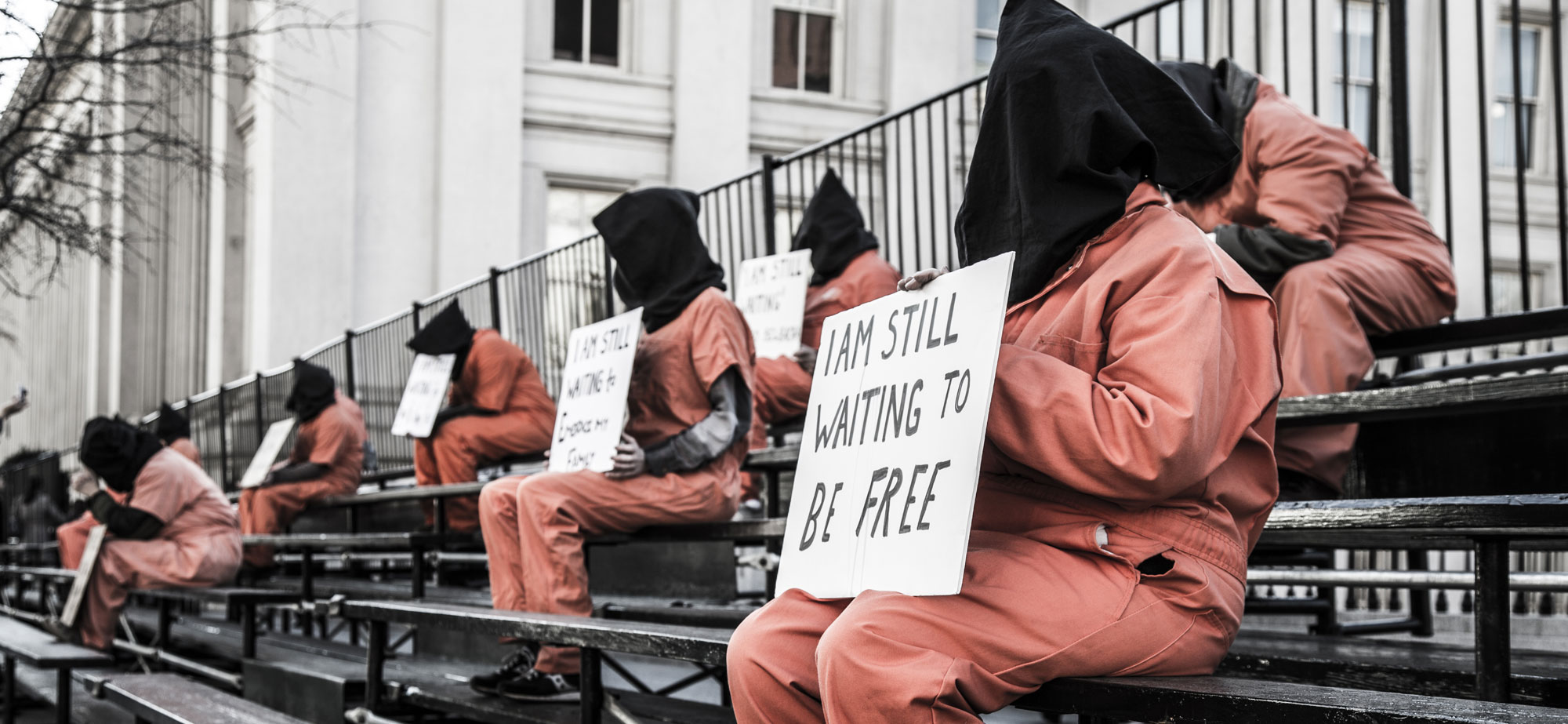From the Archive
Open letter to John Kerry from Helen Schietinger and Jeremy Varon

12 March 2015
Dear Secretary Kerry,
I am Helen Schietinger, the woman who was arrested while speaking to you from the audience at the March 11th Senate Foreign Relations Committee hearing on possible revisions to the Authorization of the Use of Military Force passed just after September 11, 2001. You were asking for Congressional authority to demolish the so-called Islamic State (IS), or Daesh. You made it sound as though you have an explicit military target that can easily be bombed into obliteration, wiping out the group.
We are both members of Witness Against Torture, which has long sought to close the US detention camp at Guantanamo and end US torture. I raised my voice on behalf of this group and the millions of Americans who feel that there is a better way than the vision of vengeance, militarism, and aggression that the United States has pursued for the last fourteen years.
At the hearing, Arn Menconi from Code Pink challenged you, saying the American people are tired of endless war and don’t want to kill more innocent people. In response, you invoked the terrorists’ beheading of foreign journalists and burning alive of a Jordanian pilot. We are all horrified by these atrocities, which have no justification whatsoever. Indeed, the Islamic State is a menace, which victimizes Muslims, Kurds Christians and Jews, various religious minorities, women, and gay and lesbian peoples. It must be stopped.
But I felt compelled to speak out against the devastating violence perpetrated by the United States. It both fuels further hatred against our country and badly compromises the American claim to any moral high ground, in the fight against the Islamic State and beyond. In light of Abu Ghraib, CIA torture, a war in Iraq based on documented lies, and wanton drone strikes, how can the world accept that the United States uses military force to protect and promote democracy, human rights, and the rule of law? Will more US military aggression further the cause of peace and justice, or lead to more mistrust, hatred, and violence? Must the United States meet perceived threats with military force? Or is there a way to prevent the endless escalation of war, and the harm it does to all sides, including our own?
These fundamental questions are scarcely being asked in the national debate on IS and, more broadly, on how the United States should navigate the staggering complexities in the wake of its invasions of Afghanistan and Iraq. Nor did I hear them in your testimony before Congress or in the response of the committee. And so I spoke out in hopes that we might, as a nation, bravely ask at least the right questions. Drone strikes lie at the heart of these questions. U.S. drone attacks — supposedly “surgical” in nature — do not simply behead; they blow bodies into scattered pieces such that even families members cannot recognize their loved ones. Go speak to the traumatized villagers who have survived our attacks, as Americans in Code Pink have done. Listen to the bereaved fathers, mothers, and children and then ask how the United States, in good conscience, can execute such attacks.
I reiterated in the hearing that the United States is killing innocent people with drones. Drones are not like guns; they don’t hit one person. A drone fires a missile that explodes on the ground in a blast that kills everything and everyone nearby. Hellfire missiles burn people alive, reminiscent of the terrible napalm that burned the flesh off of children in the Vietnam War, which you so rightly came to oppose. According to Micah Zenko of the Council on Foreign Relations, 500 drone strikes outside Iraq and Afghanistan have killed 3,674 people, including 473 civilians (http://blogs.cfr.org/zenko/2014/11/21/americas-500th-drone-strike/, 21 Nov 14). To assassinate the Taliban commander Qari Hussain in Pakistan, the U.S. deployed a total of 6 drone strikes over a period of months. The last drone fired the missile that finally killed Hussain, but by then 128 other people, including 13 children, had also been killed. (WAPO, Miller, 18 Aug 14; http://www.washingtonpost.com/world/national-security/yemeni-victims-of-us-military-drone-strike-get-more-than-1million-in-compensation/2014/08/18/670926f0-26e4-11e4-8593-da634b334390_story.html)
In a BBC interview you claimed, “The only people that we fire a drone at are confirmed terrorist targets at the highest level after a great deal of vetting that takes a long period of time. We don’t just fire a drone at somebody and think they’re a terrorist.” (BBC, May 28, 2013; http://www.bbc.com/news/world-radio-and-tv-22690918) This is a fantasy, either childish in its naiveté or chilling in its cynicism. As you know — or should know — drone strikes are hardly so “precise.” As The Intercept documents, “trace killings” by drones often identify their targets by the crude use of anonymous cell-phone data. (https://firstlook.org/theintercept/2014/02/10/the-nsas-secret-role/) It remains far from clear that the people who are singled out are implicated in any acts of aggression. “Collateral damage” — the accepted killing of civilians in the process — adds additional, reckless killing to the charade of targeted executions.
To be clear, we are talking here about extrajudicial assassinations.The United States condemns such violence as human rights violations when conducted by other countries, but excuses them when part of our “war on terror.” At the hearing, I heard you defending drone killings without even acknowledging that they often result in the gruesome deaths of innocent bystanders.
Another issue absent from serious discussion in the United States is our own country’s role in creating IS. The Islamic State, according to credible journalists and other analysts, arose from the desire of Iraq’s Sunni Muslims to defend themselves against the US-backed, Shia government in Iraq, which brutally oppressed Sunni populations in post-invasion Iraq. More particularly, the IS was born in Camp Bucca — a US-run detention facility in Iraq notorious for human rights abuses including torture. (http://www.washingtonpost.com/news/morning-mix/wp/2014/11/04/how-an-american-prison-helped-ignite-the-islamic-state/.) There, al-Baghdadi and other Sunni militants radicalized the victims of Iraqi and US abuse, sowing the seeds of IS. How long will we stab at the monsters of our own, partial creation? How long will we chase the ghosts of “blowback”? When can we have an honest discussion, based on a thorough reckoning with our own conduct, of what it means to make the world more safe, democratic, and freedom-loving?
The cheapening of life by the Islamic State is deplorable. America’s reckless bloodletting is also lamentable. Whether for the sake of some demented conception of what IS believes is “pure Islam” (which degrades a noble religion, as President Obama acknowledges) or for the limitless pursuit of National Security, the deliberate or reckless killing of civilians remains a crime. So long as our policies do not change, the United States will continue to suffer the moral consequence of our actions and continue to engender the hatred of those who see us as an enemy — and not a champion — of human rights.
The image of IS victims dressed in orange jump suits — deliberately mimicking the uniforms worn by US detainees at Guantanamo — is seared in the minds of Americans. The Islamic State’s message is clear: human rights violations by the United States will not be forgotten. We ignore or excuse these violations at our own peril. That is the urgent message I sought to share with you and the world with my untimely words in Congress.
You, Secretary Kerry, know well the long record of US abuse. In May 1971, you confronted as a veteran of the Vietnam War the very same Senate Foreign Relations Committee with your passionate denunciation of the conflict, emphasizing how American “boots on the ground” bore the worst brunt of state lies. (https://facultystaff.richmond.edu/~ebolt/history398/johnkerrytestimony.html) Your words remain among the most eloquent denunciations of war ever uttered in our nation’s history. We cannot imagine that you have forgotten the spirit of your own testimony, which cast a suspicious eye on the sacrifice of life on behalf of supposed national interests. We urge that you revisit your own words as you consider how — and if — more war can further the values of peace and justice our nation purports to defend.
The solution to terrorism, we maintain, is not brute force. That path has been tried, and has failed. The Islamic State is, in part, the bitter fruit of our own benighted policies.
As my sign in the hearing said: There is no military solution.
Sincerely,
Helen Schietinger, Registered Nurse, Witness Against Torture
Jeremy Varon, Witness Against Torture



Join us on social media